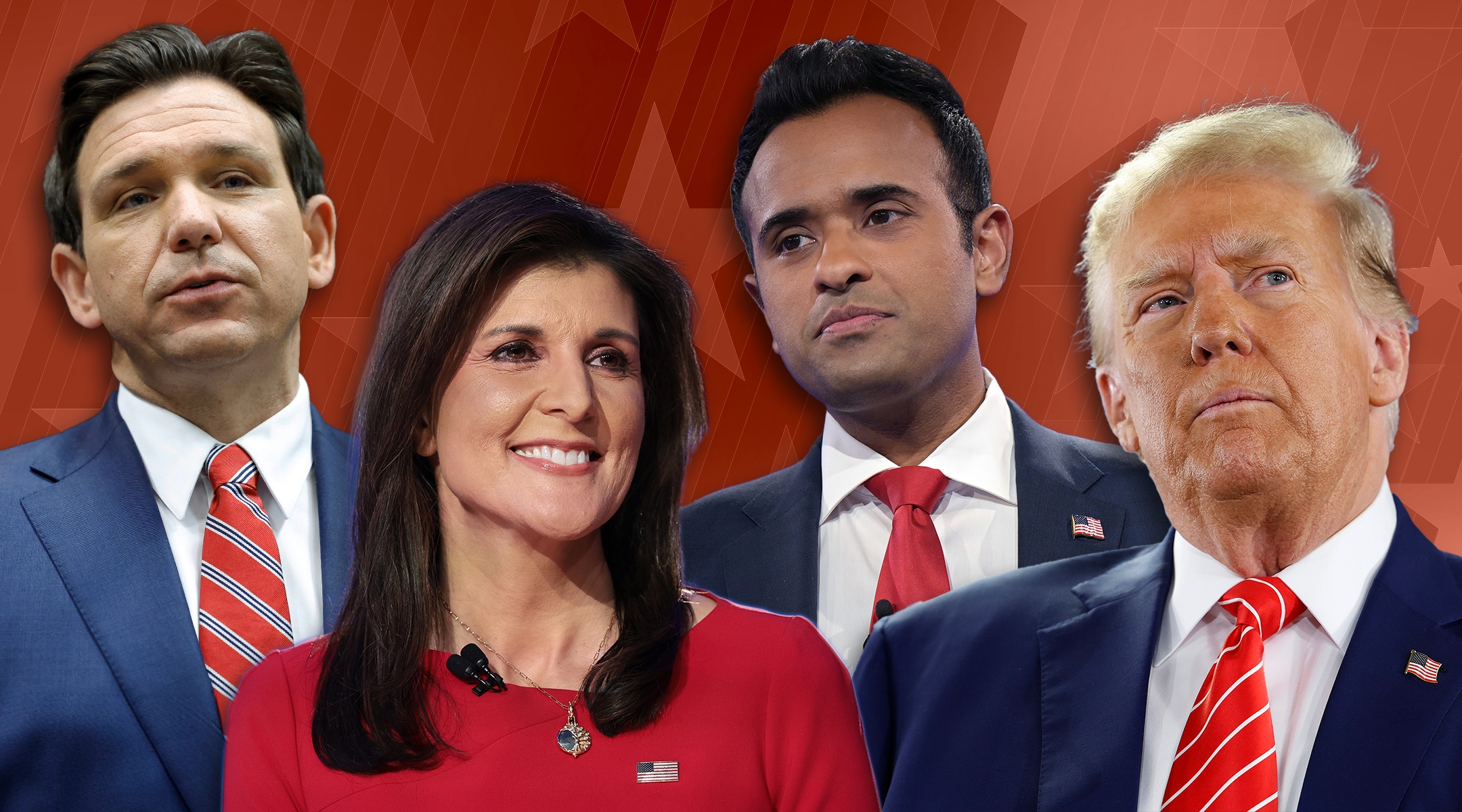(JTA) — With the arrival of the Iowa Caucus on Monday, the 2024 presidential primary season is officially underway — and so is the race to win the votes of Jewish and pro-Israel voters.
Five Republicans are vying to be the candidate to face off against President Joe Biden. Former President Donald Trump maintains a considerable lead in the polls, while challengers Nikki Haley, Ron DeSantis and Vivek Ramaswamy remain firmly in the race. Former Arkansas Gov. Asa Hutchinson is still in the mix but is polling below 1%.
The Iowa Caucus has kicked off the Republican presidential primary for decades, and its significance is more symbolic than substantive. Of the more than 2,000 delegates needed to secure the party’s nomination, Iowa awards only 40.
But Iowa, along with the other early states — the caucus is followed by New Hampshire on Jan. 23 and Nevada Feb. 6 — are a chance for candidates to build momentum and exceed expectations. The Iowa Caucus is not necessarily predictive, however: The GOP’s nominees in 2008, 2012 and 2016 all lost in Iowa.
Israel has featured heavily in the Republican primary, even before the outbreak of the country’s war with Hamas on Oct. 7.
At the first GOP debate in August, Haley and Ramaswamy tangled over their views on Israel aid, and more recent debates have included discussions about Israel’s war strategy, whether to send U.S. troops to Gaza and the possibility of expelling Palesintians from the Gaza Strip. At the first debate after Oct. 7, the Republican Jewish Coalition was named a cosponsor.
As the primary season kicks off, here’s a guide to each of the major candidate’s Jewish bona fides, listed in order of their polling averages.
Donald Trump
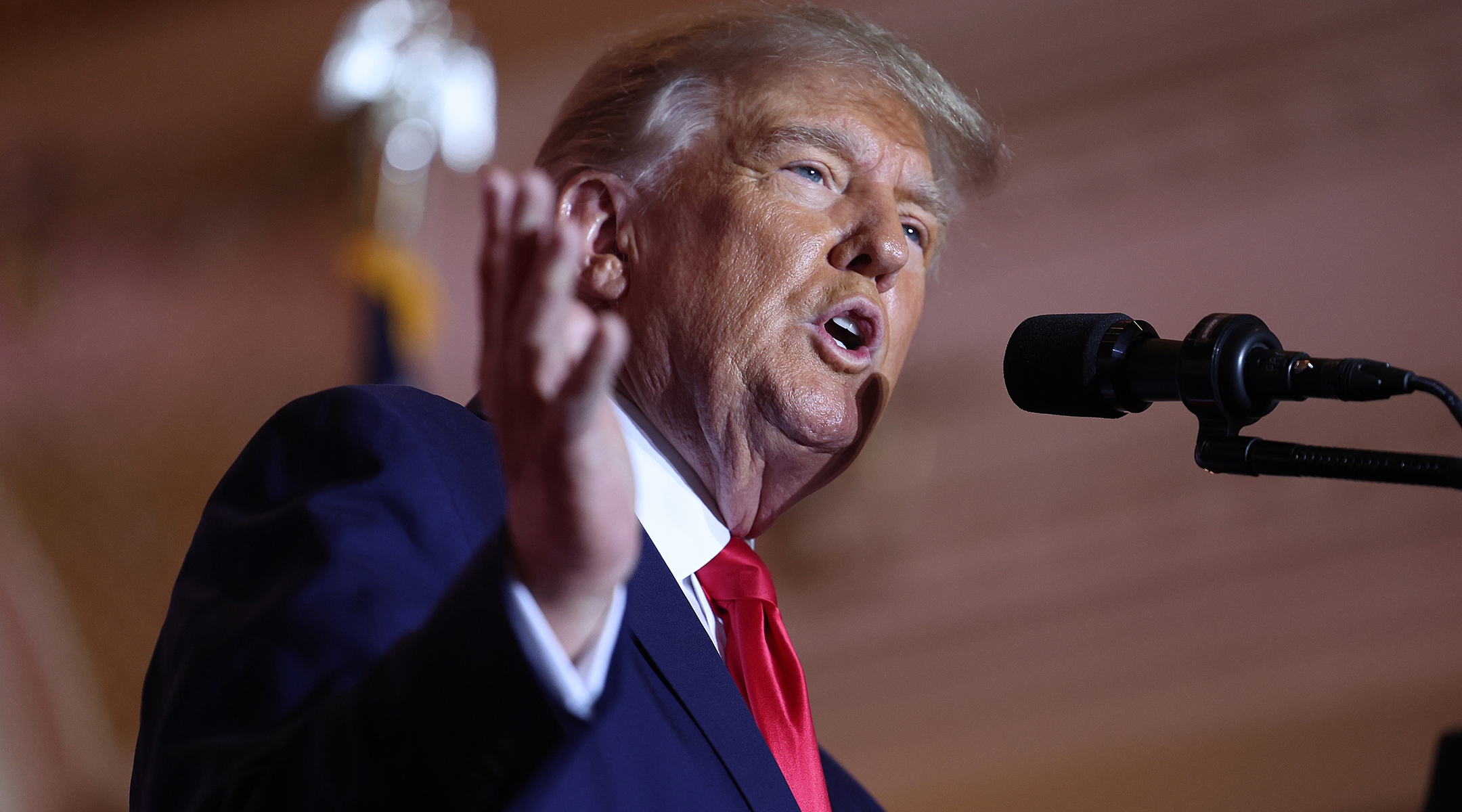
Former U.S. President Donald Trump speaks during an event at his Mar-a-Lago home in Palm Beach, Fla., Nov. 15, 2022. (Joe Raedle/Getty Images)
For some Jewish Republicans, the prospect of another Trump presidency elicits anxiety — especially given the isolationist picture Trump has painted of his potential future administration.
Some insiders have pointed to fear among GOP Jewish donors that Trump has alienated himself from many of the Jewish and pro-Israel advisers who shaped his first-term foreign policy such as his son-in-law, Jared Kushner. They have been replaced by isolationists who have flirted with antisemitism, such as Trump’s former national security adviser, Michael Flynn.
That said, many Jewish Republicans view Trump as one of the most pro-Israel presidents ever, as does Trump himself. During his first term, Trump fulfilled wishes of the pro-Israel right: moving the U.S. embassy to Jerusalem, pulling out of the Iran nuclear deal, recognizing Israel’s sovereignty over the Golan Heights and more.
At a rally in Florida just days after Oct. 7, Trump criticized Israeli leadership and praised Hezbollah as “very smart,” drawing ire from his fellow candidates, including DeSantis.
The former president also faces several legal challenges related to his businesses, defamation and sexual assault, classified documents, election subversion and others. Efforts are underway in many states to remove Trump from their ballots.
Ron DeSantis
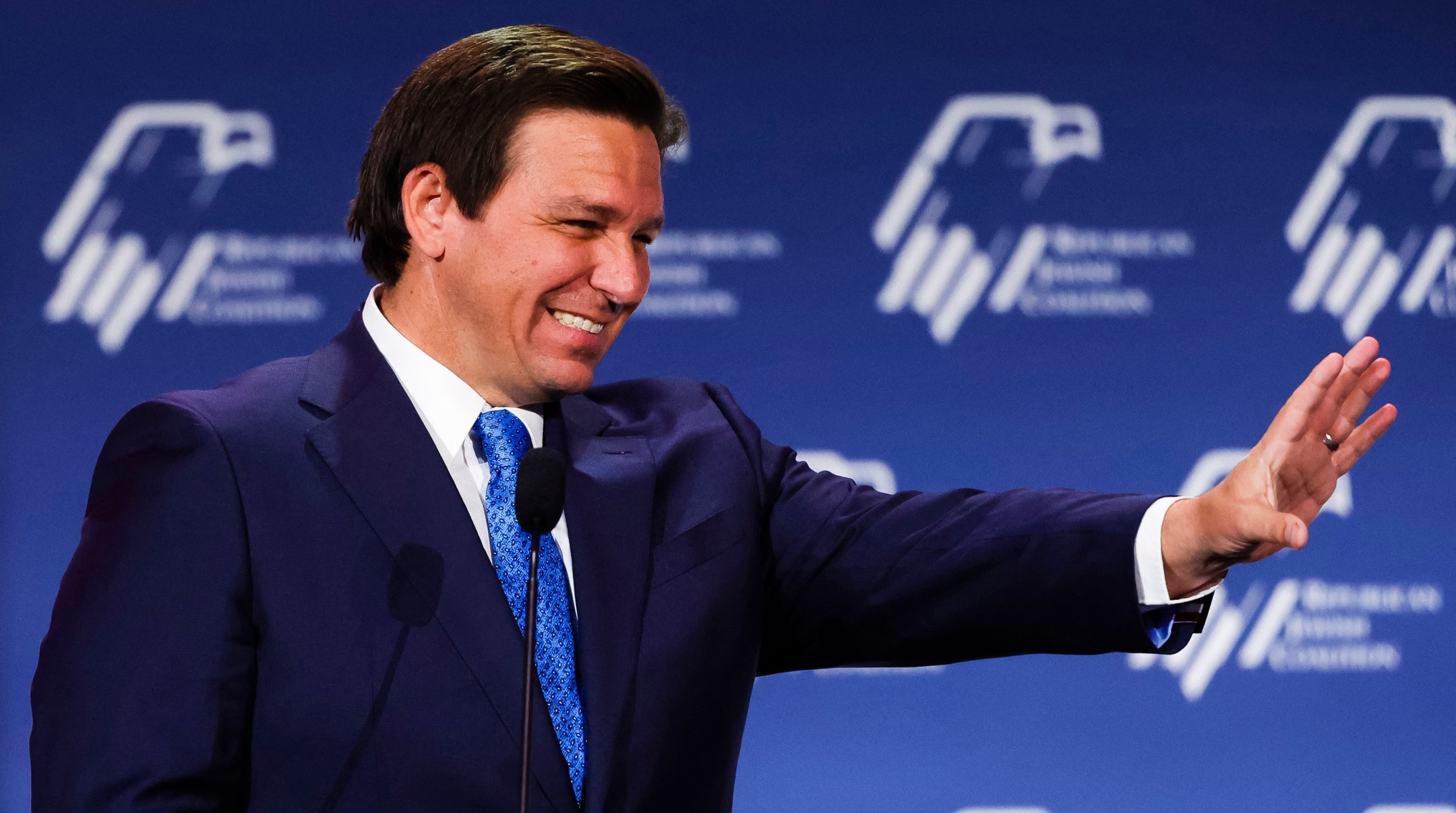
Republican Florida Governor Ron DeSantis waves to supporters at the Republican Jewish Coalition Annual Leadership Meeting in Las Vegas, Nov. 19, 2022. (Wade Vandervort, /AFP via Getty Images)
DeSantis is viewed by many as a steadfast supporter of Israel. The Florida governor visited Jerusalem last spring, voicing support for West Bank settlements and signing a bill that increased penalties for antisemitic harassment.
But just two weeks after his Israel trip, DeSantis’ education department rejected two new textbooks on the Holocaust as part of his campaign against what he calls “woke indoctrination.”
These two dynamics have come to define DeSantis’ relationship with Jewish voters and groups, especially in Florida, which is home to a sizable Orthodox population. His stance on abortion has also proven unpopular among the Jewish electorate.
Read more about DeSantis’ Jewish record here.
Nikki Haley
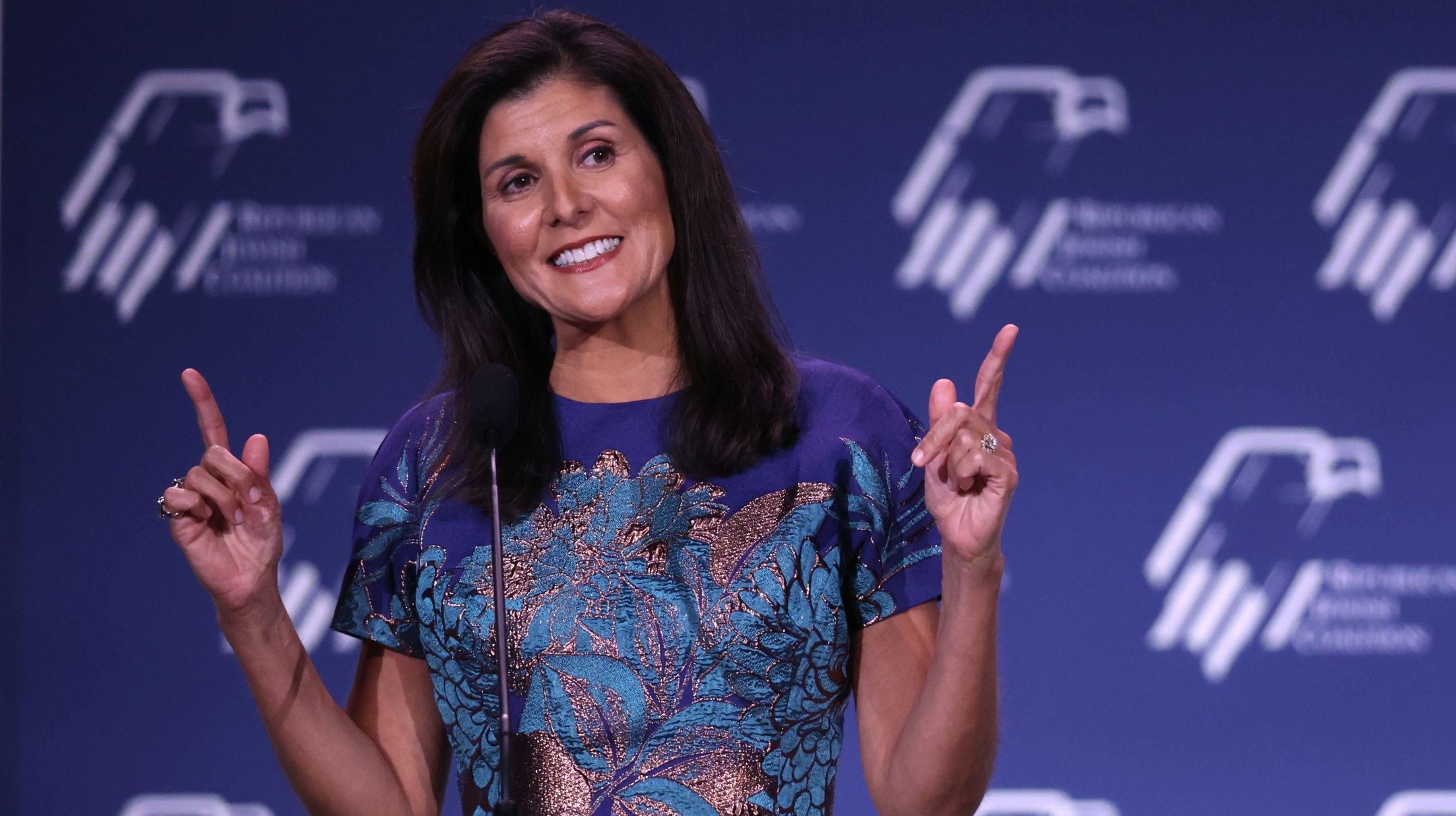
Former U.N. Ambassador Nikki Haley speaks to guests at the Republican Jewish Coalition Annual Leadership Meeting in Las Vegas, Nov. 19, 2022. (Scott Olson/Getty Images)
Haley, the former South Carolina governor and United Nations ambassador, also boasts a solid pro-Israel reputation. In recent weeks, as get poll numbers have risen, she has emerged as a favorite of Jewish Republican donors looking for an alternative to Trump.
Haley’s tenure at the U.N., during which she promised to prevent Palestinians from ascending to top jobs and removed united United States from the body’s Human Rights Council, made her a star at conferences of American Israel Public Affairs Committee and the Republican Jewish Coalition.
Last summer during the first GOP debate, Haley shot back swiftly after Ramaswamy suggested cutting aid to Israel.
“He wants to stop funding Israel. You don’t do that to your friends,” she said. “It’s not that Israel needs America. America needs Israel.”
More on Haley, the lone woman in the GOP primary, here.
Vivek Ramaswamy
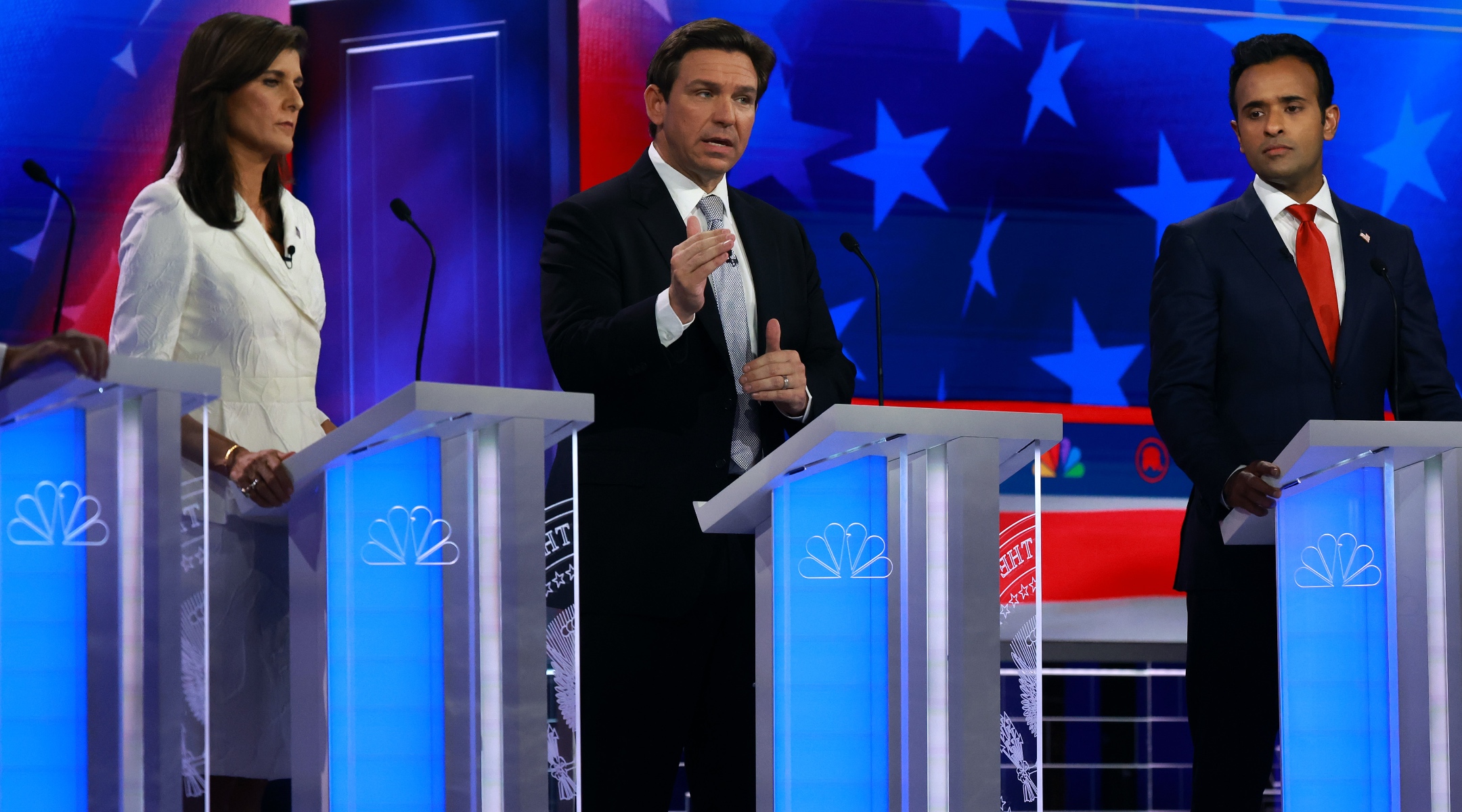
Republican presidential candidate Florida Gov. Ron DeSantis, in the center, speaks alongside former U.N. Ambassador Nikki Haley and Vivek Ramaswamy during the NBC News Republican Presidential Primary Debate at the Adrienne Arsht Center for the Performing Arts of Miami-Dade County in Miami, Nov. 8, 2023. (Joe Raedle/Getty Images)
The millionaire biotech entrepreneur breaks with his fellow Republicans on the issue of aid to Israel.
Ramaswamy, who has not held elected office, has said he believes Israel should not get more aid from the United States than its Middle Eastern neighbors after 2028, the year the current U.S. aid package of $38 billion is set to expire.
He added that he would work to expand the Abraham Accords, the series of normalization deals between Israel and Arab countries.
“Come 2028, that additional aid won’t be necessary in order to still have the kind of stability that we’d actually have in the Middle East by having Israel more integrated in with its partners,” Ramaswamy said in August.
Ramaswamy, who was a member of a Jewish leadership society at Yale University, also raised eyebrows when he appeared on the podcast of an influencer who has accused Jews of owning “almost everything.” A spokeswoman for his campaign said he was unaware of the host’s views on Jews going into the interview.
Here’s our full Jewish explainer on the long-shot candidate.
JTA has documented Jewish history in real-time for over a century. Keep our journalism strong by joining us in supporting independent, award-winning reporting.
